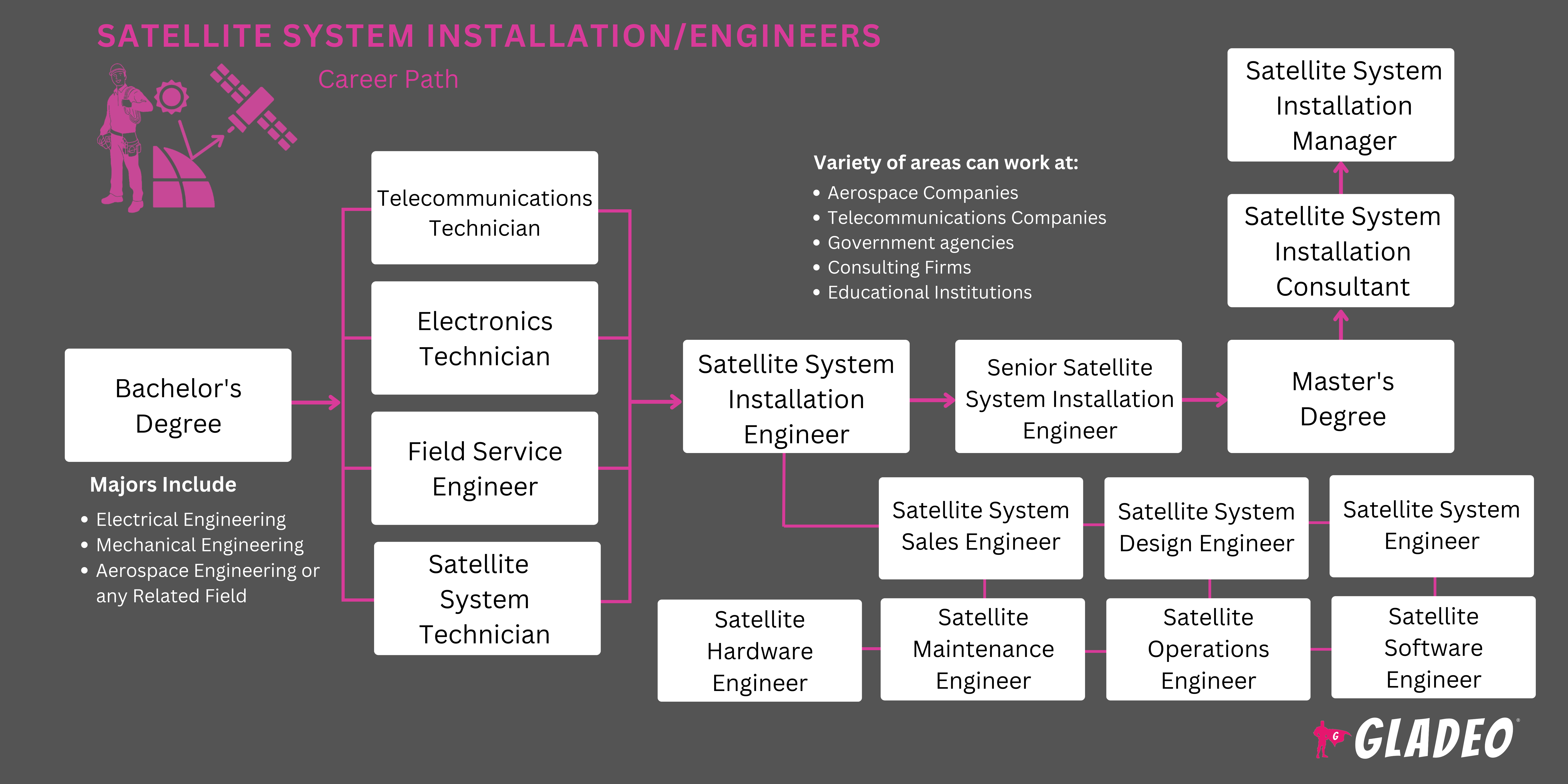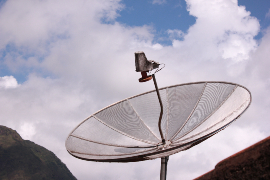스포트라이트
위성 통신 엔지니어, 위성 시스템 기술자, 위성 네트워크 엔지니어, 위성 지상 시스템 엔지니어, 위성 운영 엔지니어, 위성 시스템 통합 엔지니어, 위성 안테나 엔지니어
현대 사회는 위성 기술에 의존하여 TV, 전화, 인터넷, 라디오 통신을 제공할 뿐만 아니라 GPS, 일기 예보, 지도 제작, 우주 탐사에도 활용하고 있습니다. 하지만 위성은 지상국, 제어 시스템 및 통신 링크를 포함하는 더 큰 복잡한 시스템의 일부일 뿐입니다.
위성 시스템 엔지니어는 통신, 컴퓨터 과학, 항공우주 공학 원리를 결합하여 이러한 상호 연결된 시스템을 만들고, 설치하고, 관리하는 핵심적인 역할을 담당합니다. 또한 위성 장비를 설치하고, 위성 접시를 정렬 및 보정하며, 데이터 전송의 효율성과 보안을 보장하는 일도 담당합니다.
이들의 첨단 기술 작업은 세계를 더 잘 연결하고 보호하기 위해 설계된 수천 개의 상업, 정부 및 탐사 프로젝트에 매우 중요합니다!
- 최첨단 위성 시스템으로 작업하기
- 통신 및 데이터 전송 기능 향상
- 글로벌 위성 인프라 발전 기여
근무 일정
위성 시스템 엔지니어는 일반적으로 풀타임으로 근무하며, 중요한 프로젝트 단계에서는 가끔 초과 근무를 하기도 합니다. 이 역할은 현장 설치, 테스트 및 유지 관리를 위해 출장이 필요할 수 있습니다.
일반적인 의무
- 통신, 전력 및 추진 시스템을 포함한 위성 하위 시스템을 설계, 개발 및 유지 관리합니다.
- 과학자, 엔지니어, 디자이너와 협업하여 시스템 설계를 최적화하고 실험 및 페이로드를 개발하세요.
- 운영상의 필요에 따라 위성 접시 및 장비 설치 및 구성
- 최적의 기능과 안정적인 데이터 전송을 보장하기 위한 평가 및 품질 보증 테스트 수행
- 궤도 분석 및 임무 계획 수행
- 현장 조사 및 설치 계획에 참여하기
- 지속적인 서비스를 보장하기 위해 위성 시스템 및 장비 모니터링 및 업데이트
- 위성 시스템 관련 기술 지원 및 교육 제공
- 데이터베이스 시스템 관리, 위성 운영용 소프트웨어 개발, 네트워크 프로토콜 사용
- 시스템 성능에 대한 자세한 보고서 및 권장 사항 준비
- 운영 효율성을 지속적으로 개선하기 위한 발전 사항을 최신 상태로 유지하세요.
- 프로세스 자동화 감독, 네트워크 운영 문제 해결, 품질 개선 프로세스 관리
추가 책임
- 우주 환경 복원력을 위해 위성 구성 요소에 대한 환경 테스트 수행
- 위성 통신을 위한 주파수 관리 및 할당
- 위성 라이선싱 및 규정 준수를 위한 국제 규제 기관과의 협력
- 새로운 위성 기술 및 방법을 위한 연구 개발에 참여하세요.
- 위성 해체 및 수명 종료 절차 계획 및 실행
소프트 스킬
- 적응성
- 분석적 사고
- 세부 사항에주의
- 명확한 커뮤니케이션
- 창조성
- 독립
- 혁신
- 지도력
- 문제 해결
- 자기 동기 부여
- 팀워크
기술 능력
- 위성 시스템 및 구성 요소에 대한 숙련도
- 무선 주파수 엔지니어링에 대한 지식
- 위성 접시 정렬 및 보정 경험
- 신호 처리 및 데이터 전송에 익숙함
- 통신 원리에 대한 이해
- 위성 시스템 설치 및 유지 관리와 관련된 소프트웨어 기술
- 궤도 역학 및 우주 환경
- 시스템 통합 및 종합적인 테스트 기술
- 프로그래밍 언어(예: C++, Python 또는 MATLAB) 숙련도
- 항공우주 기업
- 방송사
- 정부 기관(국방, 우주 등)
- 해양 및 항공 산업
- 연구 및 개발 조직
- 위성 서비스 제공업체
- 통신 회사
위성 시스템 설치 엔지니어는 높은 곳에서, 다양한 기상 조건에서, 외딴 곳에서 일할 수 있습니다. 때로는 불규칙한 근무 시간으로 육체적으로 힘든 일이 될 수 있습니다.
위성을 효과적으로 탐색하고 유지 관리하려면 궤도 역학 및 우주 환경에 대한 깊은 이해가 있어야 합니다. 또한 위성 시스템의 통합과 종합적인 테스트에 능숙하여 구성 요소가 일관되고 효율적으로 작동하는지 확인해야 합니다.
또한 이러한 엔지니어는 위성 운영을 제어하고 데이터를 처리하는 소프트웨어 시스템을 개발, 유지 관리 및 업그레이드하기 위해 프로그래밍 언어에 능숙해야 합니다.
한 가지 중요한 추세는 대형 위성에 비해 효율성이 뛰어난 더 작고 저렴한 위성인 SmallSats 및 CubeSats의 배치가 증가하고 있다는 점입니다.
이러한 소형 위성 별자리에 저궤도를 활용하면 지연 시간을 줄여 높은 대역폭이 필요한 애플리케이션의 통신을 개선하는 데 도움이 됩니다. 이러한 진화를 더욱 촉진하는 것은 재사용 가능한 로켓 발사 기술의 출현으로, SpaceX의 팰컨 9이 그 예입니다.
위성은 5G 네트워크 개발, 특히 외딴 지역에 백홀 서비스를 제공하는 데 있어서도 상호 보완적인 역할을 하고 있습니다. 한편, 사물 인터넷은 위성을 사용하여 지상 네트워크가 도달할 수 없는 지역의 디바이스를 연결하고 있습니다! 빔포밍, 비 정지궤도 위성, 소프트웨어 정의 네트워킹, 고처리량 위성 등 다양한 발전이 이루어지고 있습니다!
어렸을 때 위성 시스템 엔지니어는 우주 임무와 우주 비행사에 관한 책을 읽거나 망원경으로 하늘을 관찰하는 등 우주와 천문학에 흥미를 느꼈을 것입니다. 이러한 호기심은 모형 로켓을 만들거나 과학 클럽에 참여하는 등의 취미를 통해 STEM 과목으로 확장되었을 가능성이 높습니다. 그들도 공상 과학 팬이었을지도 모릅니다!
- 위성 시스템 설치 엔지니어는 일반적으로 전기 공학, 통신 또는 항공 우주 공학 학사 학위가 필요합니다.
- 전공에 따라 관련 교과목이 포함될 수 있습니다:
- 안테나 이론
- 컴퓨터 프로그래밍(예: Python, C++)
- 디지털 신호 처리
- 전자 및 회로 설계
- RF 엔지니어링
- 위성 통신
- 통신 시스템
- 통신 또는 항공우주 회사에서 인턴십을 통해 실무 경험을 쌓을 수 있습니다.
- 인증에는 IS4의 공인 공간 보안 전문가 전문가와 같은 옵션이 포함됩니다.
- 공학 학위를 취득한 사람은 공학 기초 시험에 응시하고, 미국 공학 및 측량 시험 위원회의 엔지니어 인 트레이닝 자격증을 취득하고, 미국 전문 기술자 협회의 전문 기술자 면허를 취득할 수 있습니다.
- 전기 공학, 통신 또는 항공 우주 공학 분야의 ABET 인증 프로그램을 찾아보세요.
- 사용 가능한 재정 지원 및 장학금 기회와 등록금 비용을 비교합니다.
- 프로그램 형식(캠퍼스 내, 온라인 또는 하이브리드)을 결정합니다.
- 최신 실험실 및 연구 공간에 대한 교수진의 자격 및 시설 평가
- 풍부한 학습 경험을 위해 산업/연구 기관과의 파트너십을 조사합니다.
- 취업률 및 동문 네트워크의 강도와 같은 졸업 후 결과를 고려하세요.
- 노련한 위성 시스템 엔지니어에게 정보 제공 인터뷰를 요청하여 질문할 수 있습니다!
- 커리어 분야와 관련된 동영상을 시청하고 블로그를 읽으며 최신 트렌드와 기술을 익히세요.
- 인디드닷컴과 같은 고용 포털에 게시된 채용 공고의 직무 설명을 읽고 가장 최신의 자격 요건을 확인하세요.
- 고등학교에서는 수학(대수, 기하, 미적분, 미적분학), 통계, 컴퓨터 과학 또는 프로그래밍 언어, 물리, 화학, 천문학, 전자공학, 로봇 공학, 컴퓨터 지원 제도, 영문 작문 등을 집중적으로 학습하세요.
- Python 및 C++와 같은 프로그래밍 언어 공부하기
- 대학에서 위성 통신(SATCOM)에 대해 배우기 위해 공부를 계속하세요.
- 컴퓨터 클럽과 같은 과외 활동에 참여하여 소프트 스킬을 배우고 익히세요.
- 과학 박람회에 참가하여 실력을 뽐내고, SATCOM 포럼 및 토론 그룹에 참여하세요.
- 인턴십에 지원하여 해당 분야에 대한 직접적인 지식을 습득하세요.
- 업무 이력서를 시작하여 업무 및 학업 성취도를 추적할 수 있습니다.

- 위성 기술 분야의 인턴십을 찾아서 입문하세요.
- 위성 시스템 엔지니어 이력서 템플릿 및 샘플 면접 질문 검토하기
- 인디드닷컴과 같은 구직 포털에 이력서를 업로드하고 위성 설치, RF 엔지니어링, 통신, 안테나 교정, 디지털 신호 처리 및 기타 관련 용어와 문구 등의 키워드를 포함하세요.
- 컨퍼런스 및 세미나에서 SATCOM 전문가들과 네트워크를 형성하세요. 구직 중임을 알리세요!
- 전문 LinkedIn 계정을 만들고 잠재적 인맥에게 연락하세요.
- SATCOM 업계 뉴스와 용어를 숙지하여 면접에 대비하세요.
- 잠재적 고용주를 조사하고 채용 페이지에서 채용 정보를 확인하세요.
- 이전 상사나 교사에게 추천인 역할을 해주거나 추천서를 써줄 수 있는지 물어보세요.
- 대학 커리어 센터에 문의하여 이력서 작성 및 모의 면접에 대한 도움을 받으세요.
- 면접을 위한 전문성 있는 복장
- 승진 기회에 대해 상사와 상의하세요.
- 고용주에게 도움이 되는 추가 교육 및 훈련에 기꺼이 참여할 의향이 있음을 알립니다.
- 동료, 경영진, 고객과 견고하고 신뢰할 수 있는 관계 구축
- 최신 소프트웨어와 방법론을 학습하여 기술을 날카롭게 유지하세요.
- 도전적인 프로젝트에 참여하여 자신의 역량과 다재다능함을 보여주세요.
- 전문성을 높이기 위해 석사 학위 또는 전문 자격증 취득을 고려하세요.
- 전문 분야로는 위성 시스템 설계, 안테나 엔지니어링, RF 통신, 위성 네트워크 보안 등이 있습니다.
- 해당되는 경우 전문 엔지니어 라이선스 취득
- 업계 협회 및 컨퍼런스를 통해 평판과 전문 네트워크를 강화하세요.
- 업계 저널이나 출판물에 기고하여 전문성을 보여주고 사고 리더십을 확립하세요.
- 후배나 인턴이 리더십 기술을 개발할 수 있도록 멘토링 역할을 맡으세요.
- 지속적인 개인 및 전문성 개발을 위한 피드백 구하기
웹사이트
- 미국 항공 우주 연구소
- ASC 시그널 코퍼레이션
- 아스트라니스 우주 기술
- 상업용 원격 감지 규제 업무
- 컴텍 텔레콤
- CPI Satcom & Antenna Technologies Inc.
- DataPath
- 에너지부
- 에코스타
- 연방 항공국
- 연방 통신 위원회
- 제너럴 다이내믹스
- 글로벌스타
- 휴즈 네트워크 시스템
- 전기전자기술자협회
- 통합
- 인텔샛
- 국제 전기 통신 연합
- ITC 글로벌
- Kymeta
- 키테라 공간 솔루션
- L3Harris
- 맥사르 기술
- 마이크로콤 커뮤니케이션
- 미국 항공우주국(NASA)
- 전국 방송사 협회
- 국가 환경 위성, 데이터 및 정보 서비스
- 미국 해양대기청(NOAA)
- 국가 통신 및 정보 관리
- 새로운 보안 과제 사무소
- 우주 및 첨단 기술 사무소
- 우주 상업 사무소
- 최적의 위성 통신
- 새콤 다이렉트
- 위성 산업 협회
- 국제 위성 전문가 협회
- 스페이스 마이크로
- ST 엔지니어링 iDirect
- 스티텔 네트워크
- TEKEVER
- 미국 우주군
- 위성을 통해
책
- 위성 통신 페이로드 및 시스템, 테레사 브라운, 월터 브라운 저
- 위성 통신 시스템: 시스템, 기법 및 기술, 제라드 마랄 외. 저..
- 위성 통신 시스템 공학: 대기 효과, 위성 링크 설계 및 시스템 성능, 루이스 J. 이폴리토 주니어 저.
위성 시스템 엔지니어링은 고도로 전문화된 분야이지만, 습득한 기술은 다른 다양한 기술 및 엔지니어링 분야에 적용할 수 있습니다. 항공우주 공학, 통신 공학 등 고려할 수 있는 몇 가지 대체 진로를 소개합니다. 기타 관련 직업으로는 다음과 같은 것들이 있습니다:
- 항공 우주 기술자
- 방송 엔지니어
- 화학 엔지니어
- 토목 엔지니어
- 컴퓨터 하드웨어 엔지니어
- 전기 및 전자 엔지니어
- 산업 엔지니어
- 재료 엔지니어
- 기계 엔지니어
- 원자력 엔지니어
- RF 엔지니어
- 프로그래머
- 시스템 엔지니어
뉴스 피드

주요 채용 정보

온라인 과정 및 도구








